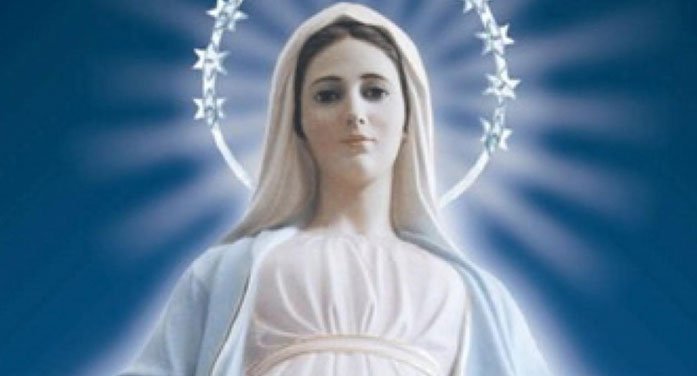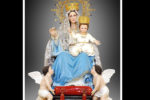Second principle: We belong to Jesus and Mary as their slaves
From what Jesus Christ is in regard to us we must conclude, as St. Paul says, that we belong not to ourselves but entirely to him as his members and his slaves, for he bought us at an infinite price-the shedding of his Precious Blood. Before baptism, we belonged to the devil as slaves, but baptism made us in very truth salves of Jesus.
We must therefore live, work and die for the sole purpose of bringing forth fruit for him, glorifying him in our body and letting him reign in our soul. We are his conquest, the people he has won, his heritage.
It for this reason that the Holy Spirit compares us: 1) to trees that are planted along the waters of grace in the field of the Church and which must bear their fruit when the time comes; 2) to branches of the vine of which Jesus is the stem, which must yield good grapes; 3)to a flock of sheep of which Jesus is the Shepherd, which must increase and give milk;4) to good soil cultivated by God, where the seed will spread and produce crops up to thirty- fold, sixty-fold, or a hundred-fold. Our Lord cursed the barren fig-tree and condemned the slothful servant who wasted his talent.
All this proves that he wishes to receive some fruit from our wretched selves, namely our good works, which by right belong to him alone, “created in Jesus Christ for good works”. These words of the Holy Spirit show that Jesus is the sole source and must be the sole end of all our good works, and that we must serve him not just as paid servants but as slaves of love. Let me explain what I mean.
There are two ways of belonging to another person and being subject to his authority. One is by ordinary service and the other is by slavery. And so we must use the terms “servant” and “slave”. Ordinary service in Christian countries is when a man is employed to serve another for a certain length of time at a wage which is fixed or agreed upon. When a man is totally dependent on another for life, and must serve his master without expecting, any wages or recompense, when he is treated just like a beast of the field over which the owner has the right of life and death, then it is slavery.
Now there are three kinds of slavery: natural slavery, enforced slavery, and voluntary slavery. All creatures are slaves of God in the first sense, for “the earth and its fullness belong to the Lord”. The devils and the damned are slaves in the second sense. The saints in heaven and the just on earth are slaves in the third sense. Voluntary slavery is the most perfect of all three states, for by it we give the greatest glory to God, who looks into the heart and wants it to be given to him. Is he not indeed called the God of the heart or of the loving will? For by this slavery we freely choose God and his service before all things, even if we were not by our very nature obliged to do so.
There is a world of difference between a servant and slave.1) A servant does not give his employer all he is, all he has, and all he can acquire by himself or through others. A slave, however, gives himself to his master completely and exclusively with all he has and all he can acquire. 2) A servant demands wages for the services rendered to his employer. A slave, on the other hand, can expect nothing, no matter what skill, attention or energy he may have put into his work. 3) A servant can leave his employer whenever he pleases, or at least when the term of his service expires, whereas the slave has no such right. 4) An employer has no right of life and death over a servant. Were he to kill him as he would a beast of burden, he would commit murder. But the master of a slave has by law the right of life and death over a servant. Were he to kill him as he would a beast of burden, he would commit murder. But the master of a slave has by law the right of life and death over him, so that he can sell him to anyone he chooses or- if you will pardon the comparison- kill him as he would kill his horse. 5) Finally, a servant is in his employer’s service only for a time; a slave for always.
No other human state involves belonging more completely to another than slavery. Among Christian peoples, nothing makes a person belong more completely to Jesus and his holy Mother than voluntary slavery. Our Lord himself gave us the example of this when out of love for us he “took the form of a slave”. Our Lady gave us the same example when she called herself the handmaid or slave of the Lord. The Apostle considered it an honour to be called “slave of Christ”. Several times in Holy Scripture, Christians are referred to as “slaves of Christ”.
The Latin word “servus” at one time signified only a slave because servants as we know them did not exist. Masters were served either by slaves or by freedmen. The Catechism of the Council of Trent leaves no doubt about our being slaves of Jesus Christ, using the unequivocal term “Mancipia Christi”, which plainly means: slaves of Christ.
Granting this, I say that we must belong to Jesus and serve him not just as hired servants but as willing slaves who, moved by generous love, commit themselves to his service after the manner of slaves for the honour of belonging to him. Before we were baptised we were the slaves of the devil, but baptism made us the slaves of Jesus. Christians can only be slaves of the devil or slaves of Christ.
What I say in an absolute sense of Our Lord, I say in a relative sense of our Blessed Lady. Jesus, in choosing her as his inseparable associate in his life, glory and power in heaven and on earth, has given her by grace in his kingdom all the same rights and privileges that he possesses by nature. “All that belongs to God by nature belongs to Mary by grace”, say the saints and, according to them, just as Jesus and Mary have the same will and same power, they have also the same subjects, servants and slaves
St. Louis De Montfort



